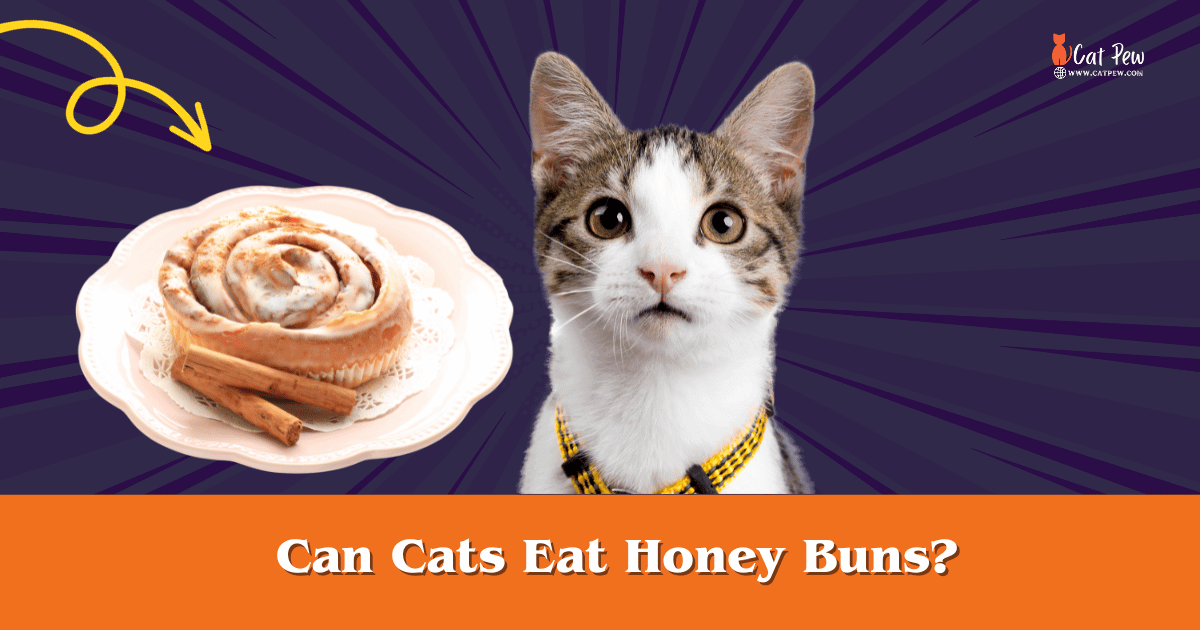Can Cats Eat Honey Buns?
Cats should not eat honey buns due to their high sugar content and potential for causing digestive issues. Honey buns may be a tempting treat for cats, but it is best to avoid them altogether.
Cats are obligate carnivores and have specific dietary needs that are different from humans. Honey buns are high in sugar, which can lead to obesity, diabetes, and dental problems in cats. Additionally, the ingredients in honey buns, such as artificial flavors, preservatives, and unhealthy fats, can be harmful to cats’ sensitive digestive systems.
It is always advisable to stick to a balanced and nutritionally appropriate diet for your feline friend, consisting of high-quality cat food and occasional cat-friendly treats specifically designed for them.
Understanding The Feline Diet
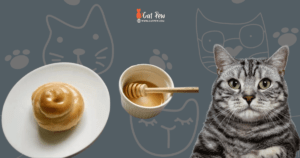
When it comes to what our furry feline friends can eat, it’s important to remember that cats are obligate carnivores. This means that their bodies are specifically designed to thrive on a diet primarily made up of animal protein. Unlike humans or other animals, cats have nutritional requirements that can only be met through the consumption of meat. Therefore, cat owners must understand the unique dietary needs of their feline companions to ensure their overall health and well-being.
Cats Are Obligate Carnivores
Cats have evolved over thousands of years as strict carnivores, meaning their bodies are designed to extract the necessary nutrients from animal sources. While they may occasionally nibble on other foods, their systems are designed to handle a diet predominantly consisting of meat. This is due to their short intestines and the specific enzymes they possess, which are optimized for digesting and absorbing nutrients from meat.
Need For A High-Protein Diet
One of the most important aspects of a cat’s diet is its high protein content. Protein is essential for building and repairing tissues, maintaining a healthy coat, and supporting a strong immune system. Without adequate protein intake, cats may experience malnutrition, muscle wasting, and a weakened immune system.
Unlike humans, cats also have a much higher protein requirement, usually around 25-30% of their total daily caloric intake. This is why it’s crucial to choose high-quality cat food that meets these protein needs. Many commercial cat foods contain a balance of animal-based protein sources, such as chicken or fish, which provide the essential amino acids that cats require.
Natural Prey Vs. Processed Foods
In the wild, cats rely on hunting and consuming their prey to meet their dietary needs. These natural foods, such as birds, mice, and small mammals, are not only high in protein but also provide essential vitamins, minerals, and other nutrients.
However, in a domestic setting, cats are typically fed processed cat food. While commercial cat foods are formulated to meet a cat’s nutritional requirements, they should still strive to mimic the nutrient profile of a cat’s natural prey as closely as possible.
When choosing cat food, it’s important to read the labels and ensure that the protein content is high and comes from animal sources. Avoid cat foods that are primarily grain-based or contain excessive fillers, as these may not provide the necessary nutrients your cat needs to thrive.
| Natural Prey | Processed Foods |
|---|---|
|
|
While some human foods, such as honey buns, may be safe for cats in small quantities, it’s important to prioritize their nutritional needs by feeding them a balanced and appropriate diet. By selecting high-quality cat food that mirrors the nutritional profile of a cat’s natural prey, you can ensure that your feline companion receives the essential nutrients for a long and healthy life.
Exploring Honey Buns
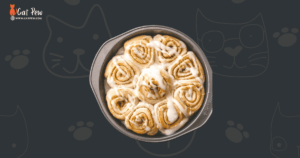
When it comes to treats, honey buns are a delightful indulgence. But can cats enjoy these sweet treats too? In this article, we will explore the world of honey buns and answer the question – can cats eat honey buns?
What Are Honey Buns?
Honey buns are a popular pastry that combines soft bread with a sweet honey glaze. This delectable treat is often enjoyed for breakfast or as a snack throughout the day. Honey buns are known for their irresistible aroma and gooey, sugary coating that makes them a favorite among many. But are they safe for our feline friends to consume?
Ingredients And Nutritional Value
Let’s take a closer look at the ingredients and nutritional value of honey buns. These sugary pastries typically contain a combination of flour, sugar, honey, yeast, eggs, and butter. They are also often topped with additional glaze or icing for added sweetness.
While honey buns may be a tasty treat for us humans, they are not ideal for our feline companions. Cats have specific dietary requirements that differ from ours, and indulging in honey buns can have adverse effects on their health. The high sugar content and the presence of ingredients like flour and butter can lead to digestive problems and weight gain in cats.
In addition, excessive sugar consumption can also contribute to dental issues in cats, such as tooth decay and gum disease. It is essential to prioritize their nutritional needs and provide them with a balanced diet specifically formulated for their well-being.
Sweetness And Potential Harm
While honey buns may be incredibly sweet and tempting to us, they can potentially harm our feline friends. Cats lack certain enzymes needed to efficiently break down and metabolize sugars and carbohydrates. Feeding them honey buns can disrupt their digestive system and cause gastrointestinal distress.
Moreover, the high sugar content in honey buns can lead to obesity in cats. Feline obesity is a serious health concern that can lead to various associated conditions such as diabetes, joint problems, and heart disease. It is crucial to provide our cats with food that meets their nutritional requirements and avoids unnecessary additives, like the ones found in honey buns.
Remember, when it comes to treating our furry companions, it’s always best to offer them treats specifically made for cats. These treats are designed to be nutritionally appropriate and safe for their consumption. Consult with your veterinarian to determine the best treats to incorporate into their diet and ensure their overall well-being.
Assessing The Risks And Benefits
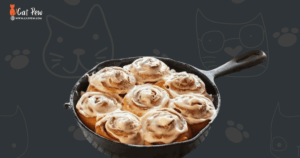
As cat owners, we naturally want to provide our feline friends with tasty treats now and then. One popular snack that might catch your cat’s attention is the honey bun. But before you give in to those pleading eyes, it’s important to understand the risks and benefits associated with feeding honey buns to cats. In this article, we delve into the topic, exploring whether cats can have small amounts of honey buns, the impact of sugar on feline health, and possible digestive issues that could arise.
Can Cats Have Small Amounts Of Honey Buns?
While it may be tempting to give your cat a nibble of your honey bun, it’s important to exercise caution. Cats have different dietary requirements than humans, and certain ingredients found in honey buns might not agree with their sensitive digestive systems.
Sugar And Its Impact On Feline Health
Beyond the general concerns associated with feeding cats human foods, the high sugar content in honey buns poses potential risks to feline health. Cats are obligate carnivores, meaning they have a limited ability to metabolize carbohydrates effectively. Excessive sugar consumption can lead to weight gain, insulin resistance, and even diabetes in cats. Additionally, the sugar found in honey buns can contribute to tooth decay and other dental problems.
Possible Digestive Issues
Feeding honey buns to your cat can also lead to digestive issues. Cats have sensitive stomachs, and introducing rich, sugary treats into their diet can disrupt their digestive balance. Common symptoms of digestive upset include diarrhea, vomiting, and discomfort. It’s crucial to prioritize your cat’s well-being and opt for cat-friendly treats that are specifically formulated to meet their nutritional needs.
In conclusion, while honey buns may seem like a sweet treat to share with your cat, it’s best to avoid feeding them this indulgence. The risks associated with the high sugar content and potential digestive issues outweigh any perceived benefits. As a responsible cat owner, it’s always important to consult with your veterinarian to ensure you are providing a balanced and healthy diet for your feline companion.
Alternatives To Honey Buns
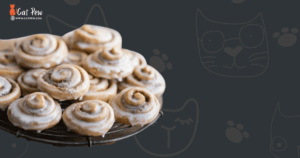
When it comes to treating our feline friends, it’s important to choose options that are not only tasty but also healthy for them. While honey buns might be a tempting treat for us humans, they are not suitable for our cats. Honey buns contain ingredients like refined sugar, artificial flavors, and preservatives that can be harmful to cats.
Healthy Treats For Cats
Cats deserve treats that are both delicious and nutritious. Thankfully, there are plenty of healthy options that can satisfy their taste buds. Here are some alternatives to honey buns that you can consider:
- Lean meats: Cooked chicken or turkey without any seasoning is a great treat option for cats. Make sure to remove the bones and skin before serving.
- Fish: Cats are known for their love of fish. You can offer them small pieces of cooked salmon or tuna as a special treat.
- Plain yogurt: Cats can enjoy plain yogurt in small quantities. It’s a good source of protein and can provide a tasty treat while also helping with their digestion.
Appropriate Fruits And Vegetables
Fruits and vegetables can also be a safe and healthy option for cat treats. However, it’s important to keep in mind that not all fruits and vegetables are safe for cats. Here are some cat-friendly options:
| Fruits | Vegetables |
|---|---|
| Bananas | Cooked carrots |
| Blueberries | Cooked green beans |
| Strawberries | Pumpkin (cooked and pureed) |
Homemade Options For A Cat-friendly Treat
If you’re looking to get creative in the kitchen, you can also make homemade treats for your cat. By using simple and cat-safe ingredients, you can ensure that your furry friend gets a delicious and healthy treat. Here are some homemade options:
- Tuna treats: Mix a can of tuna (in water) with a small amount of flour and an egg. Shape the mixture into small balls and bake them in the oven until cooked through.
- Pumpkin bites: Combine canned pumpkin puree with a small amount of oat flour and a dash of cinnamon. Roll the mixture into small balls and refrigerate until firm.
- Chicken jerky: Slice cooked chicken breast into thin strips and bake them at a low temperature until they become dry and chewy.
Remember, treats should only make up a small portion of your cat’s balanced diet. It’s important to consult with your veterinarian before introducing any new treats to ensure they are appropriate for your cat’s individual needs and health conditions.
Moderation Is Key
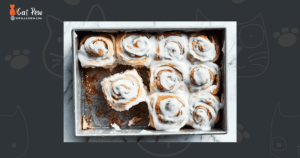
When it comes to treating our beloved feline friends, it’s important to remember that moderation is key. While it may be tempting to share a delicious honey bun with our cats, it’s essential to understand the importance of portion control and the potential risks it may pose. In this article, we will explore the significance of monitoring your cat’s portion size, being aware of any adverse reactions, and maintaining a balanced diet. By keeping these factors in mind, you can ensure your cat’s health and happiness while still indulging them with the occasional treat.
Importance Of Portion Control
Portion control plays a vital role in maintaining your cat’s weight and overall health. Just like with humans, overeating can lead to weight gain and potentially contribute to obesity-related conditions in cats. While honey buns may be a tasty treat, they are typically high in sugar and fat, which can be harmful to your cat’s well-being if consumed in excess. To avoid any potential health issues, it’s crucial to limit the amount of honey bun your cat consumes. Stick to small portions and reserve it as an occasional indulgence rather than a regular part of their diet.
Monitoring For Any Adverse Reactions
Before offering your cat a honey bun, it’s essential to monitor them for any adverse reactions. Some cats may have food allergies or sensitivities that can manifest in various symptoms such as diarrhea, vomiting, or skin irritations. To ensure your cat’s safety, introduce any new treats, including honey buns, gradually. Start with a small piece and observe your cat’s response over the next 24 hours. If you notice any unusual reactions, such as digestive issues or behavioral changes, it’s best to consult your veterinarian and avoid giving them honey buns in the future.
Balancing Treats With A Balanced Diet
While it’s enjoyable to spoil our cats with treats, it’s crucial to maintain a balanced diet to support their overall nutrition. Treats like honey buns should never replace their regular meals, as they may lack the essential nutrients that your cat needs for optimal health. To ensure a well-rounded diet, it’s important to provide your furry friend with a portion of high-quality cat food that meets their dietary requirements. Reserve the honey buns as occasional extras and make sure they only make up a small percentage of their overall calorie intake.
Remember, as much as our cats may beg for that tempting honey bun, it’s vital to prioritize their well-being. By practicing moderation, monitoring for adverse reactions, and maintaining a balanced diet, you can safely treat your cat to the occasional indulgence without compromising their health. Keep your cat happy and healthy by making informed choices and providing them with the love and care they deserve.
Frequently Asked Questions Of Can Cats Eat Honey Buns
Is Honey OK for Cats To Eat?
Yes, honey is safe for cats to eat in small amounts.
Can I Give Bun To My Cat?
No, you should not give buns to your cat. Buns are not part of their natural diet and can cause digestive problems in cats. Stick to cat-friendly food options.
Can A Dog Eat A Honey Bun?
No, dogs should not eat honey buns as they are high in sugar and can lead to obesity, digestive issues, and dental problems. Stick to a balanced diet specifically formulated for dogs.
Can Cats Eat Sweet Bread?
No, cats should not eat sweet bread as it can lead to digestive issues and obesity.
Conclusion
So, can cats eat honey buns? While cats may be intrigued by the sweet aroma of honey buns, it’s best to avoid feeding them this treat. Honey buns often contain ingredients like sugar and artificial additives that can be harmful to feline health.
Instead, opt for specially formulated cat treats that provide the necessary nutrients without any potential risks. Remember, keeping your furry friend’s diet balanced and healthy is essential for their well-being.

Winston
I'm Winston, the author of this feline-focused (Catpew.com) blog . My love for cats goes back to my childhood, when I spent countless hours playing with my family's tabby, Mittens. This furry friend instilled in me a deep appreciation for the unique personalities, playful nature, and unconditional love that cats offer.

